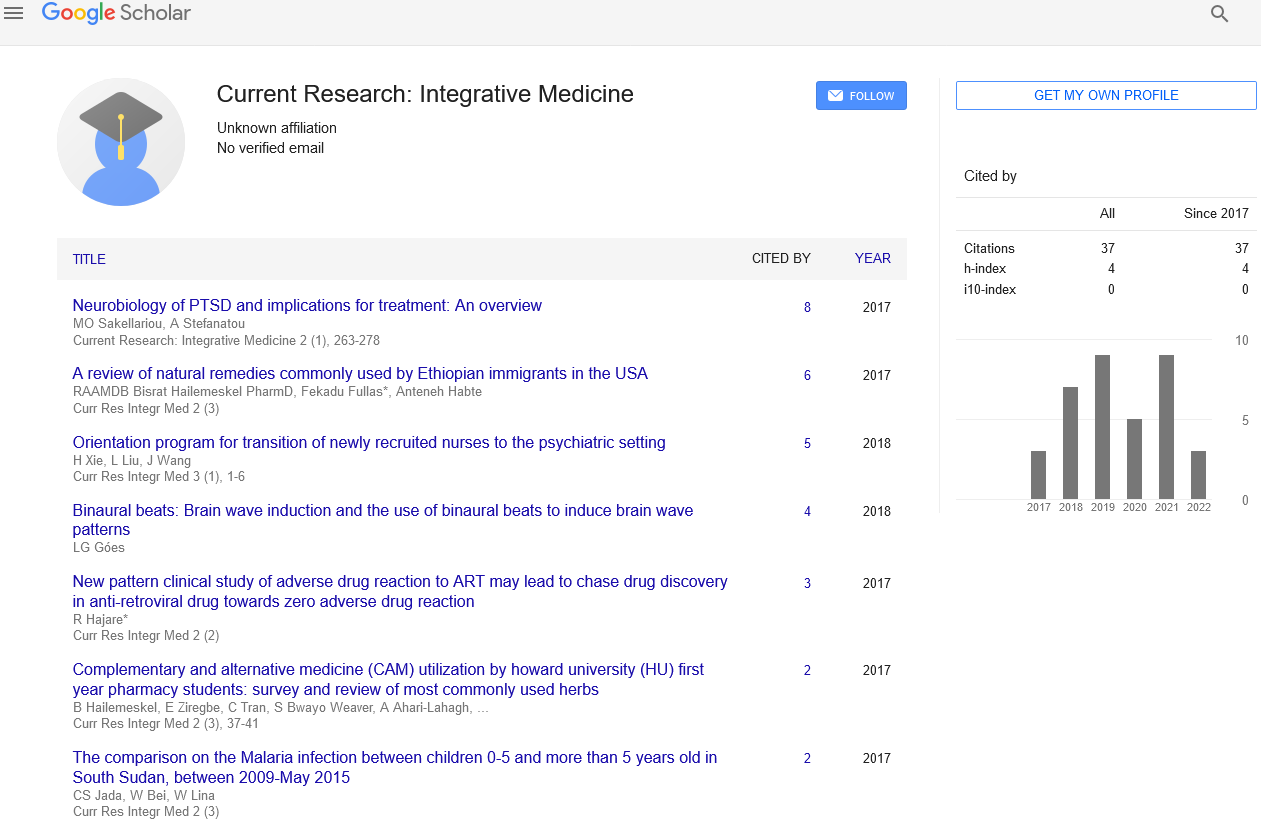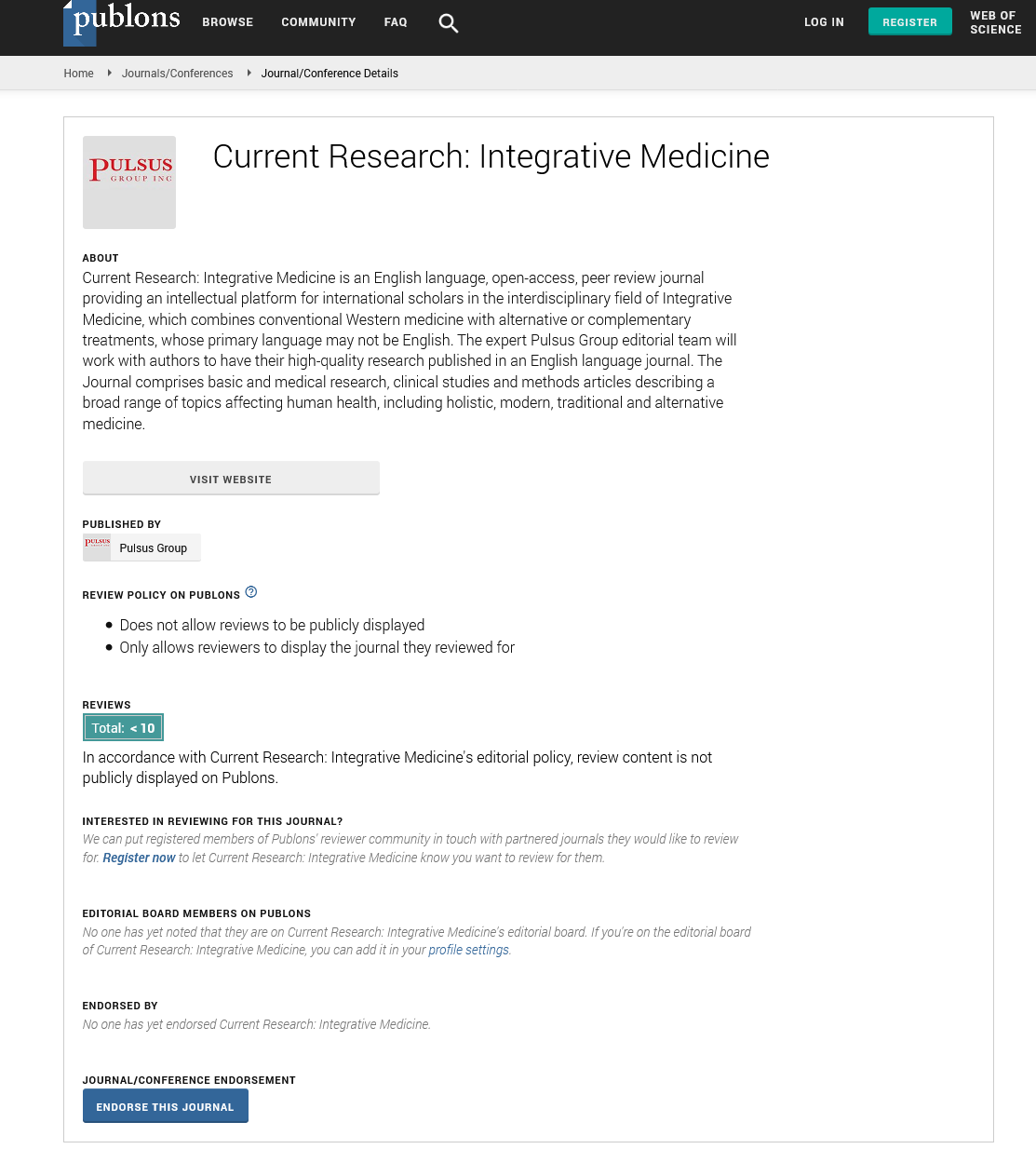The role of traditional medicine for good health & well Being
Received: 01-Jan-2022, Manuscript No. PULCRIM-21-3719; Editor assigned: 03-Jan-2022, Pre QC No. PULCRIM-21-3719 (PQ); Accepted Date: Jan 27, 2022; Reviewed: 19-Jan-2022 QC No. PULCRIM-21-3719 (Q); Revised: 22-Jan-2022, Manuscript No. PULCRIM-21-3719 (R); Published: 28-Jan-2022, DOI: 10.37532. pulcrim.22.7 (1).01
Citation: Baig Amin M. The Role of Traditional Medicine for Good Health & Well Being.Curr Res Integr Med 7(1).1.
This open-access article is distributed under the terms of the Creative Commons Attribution Non-Commercial License (CC BY-NC) (http://creativecommons.org/licenses/by-nc/4.0/), which permits reuse, distribution and reproduction of the article, provided that the original work is properly cited and the reuse is restricted to noncommercial purposes. For commercial reuse, contact reprints@pulsus.com
Commentary
Traditional, Complementary & Alternative Medicine words is commonly used in Gulf, Middle East, United States, Canada & Britain. World Health Organization (WHO) is already purposed WHO traditional medicine strategy: 2014-2023. The WHO traditional medicine strategy 2014–2023 was developed and launched in response to the World Health Assembly resolution on traditional medicine (WHA62.13). The strategy aims to support Member States in developing proactive policies and implementing action plans that will strengthen the role traditional medicine plays in keeping populations healthy. Addressing the challenges, responding to the needs identified by Member States and building on the work done under the WHO traditional medicine strategy: 2002–2005, the updated strategy for the period 2014–2023 devotes more attention than its predecessor to prioritizing health services and systems, including traditional and complementary medicine products, practices and practitioners. The WHO Traditional Medicine Strategy 2014-2023 will help health care leaders to develop solutions that contribute to a broader vision of improved health and patient autonomy. The strategy has two key goals: to support Member States in harnessing the potential contribution of T&CM to health, wellness and people centered health care and to promote the safe and effective use of T&CM through the regulation of products, practices and practitioners. These goals will be reached by implementing three strategic objectives: 1) building the knowledge base and formulating national policies; 2) strengthening safety, quality and effectiveness through regulation; and, 3) promoting universal health coverage by integrating T&CM services and self-health care into national health systems. WHO is published a report in 2019 that structured in five parts: national framework.
for traditional and complementary medicine (T&CM); product regulation; practices and practitioners; the challenges faced by countries; and finally the country profiles. Apart from the section on practices and practitioners the report is consistent with the format of the report of the first global survey in order to provide a useful comparison.The section on practices and practitioners which covers providers education and health insurance is a new section incorporated to reflect the emerging trends in T&CM and to gather new information regarding these topics at a national level. All new information received has been incorporated into individual country profiles and data graphs. The report captures the three phases of progress made by Member States; that is before and after the first WHO Traditional Medicine Strategy (1999-2005) from the first global survey to the second global survey (2005-2012) and from the second survey to the most recent timeline (2012- 2018). Accordingly of WHO report all Members countries are trying for achieve United Nation Sustainable Development Goals (UN-SDGs) 2021-2030 Dr. Margaret Chan Director General of WHO said very pleased to introduce the WHO Traditional Medicine Strategy 2014-2023. It is my conviction that it will be a valuable tool for governments, system planners and health practitioners and – most crucially – will benefit individuals seeking the right care, from the right practitioner, at the right time. In Pakistan, Bangladesh, China, Malaysia, Nepal, Sri Lanka, UAE, Oman etc are Established Departments for TCAM in deferent name like indigenous, Islamic, Greco, Herbal, Ayurveda, Siddha, Yoga, Unani, Diet Therapy (Nutrition), Homoeopathy, Tuna, Acupuncture & Physical Therapies like Reflexology, Acupressure, Massage, Sports etc. Sadri Health Services Islamabad with the collaboration of International Alternative Medical Council (IAMC) Registered Government of Pakistan serve to humanity and promote , awareness, educate, trainings for achieve the UN-SDGs Goals Instigator no 3 for Good Health & Well-Being.






